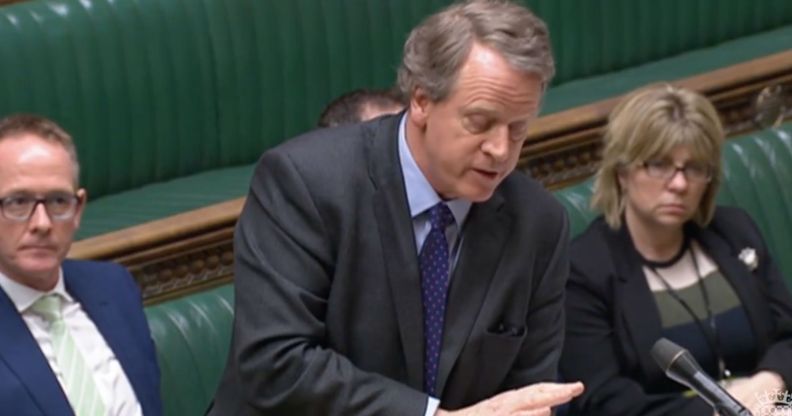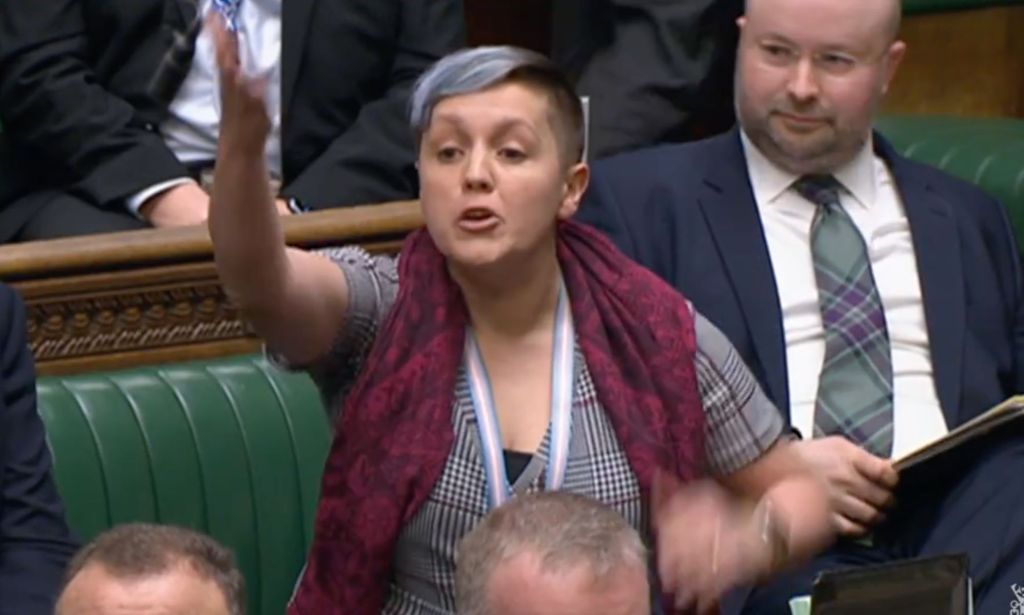Tory Scotland secretary asked to explain what a Gender Recognition Certificate does. He failed

Scotland minister Alister Jack faced a tough afternoon in the Commons. (Parliament TV)
Scotland minister Alister Jack faced a tough afternoon in the Commons. (Parliament TV)
Tory Scotland secretary Alister Jack floundered when questioned on gender recognition certificates following his move to ban Scottish reform.
Jack faced questions in the Commons on Tuesday (17 January) after he confirmed he would make a Section 35 order – a never before utilised section of the 1998 Scotland Act – to prevent the Gender Recognition Reform (Scotland) Bill from becoming law.
The measure, which passed in Holyrood in December, would expedite and simplify the process by which trans people can obtain a gender recognition certificate (GRC).
Jack said he believed the changes would have “adverse effects” on the operation of the UK Equality Act and “operations” of single-sex spaces. Scottish politicians and experts agree that the bill would have no impact on either, and much of the rhetoric around gender recognition reform confuses what a GRC actually does.
He was pressed on this by SNP MP Kirsty Blackman, who was wearing a lanyard in the colours of the trans Pride flag.
“Against a rising background of hate crime, my trans siblings will be horrified and terrified at the level of misinformation and lies in this chamber today,” Blackman said.
“Given that the secretary of state has had lots of legal advice on this – presumably, he’s had briefings on this – could he tell us, what is the effect of a gender recognition certificate? What does it entitle someone to do?”
Jack fumbled with his response, and avoided the question.
“Well, we believe – you’ll see the legal, you’ll see the reasons – I made this very clear, there is a reduction in safeguards for women and children, and you will have plenty of time to read that today,” Jack said.
Blackman could be seen on the parliamentary live broadcast gesturing in bewilderment at the reply.

Having a GRC allows trans people to update their birth certificate, get married or form a civil partnership in their affirmed gender, update their marriage or civil partnership certificate and have their affirmed gender on their death certificate.
Despite what Jack argued, the Scottish gender reform bill has absolutely no impact on the UK Equality Act.
A GRC is not a condition of access to single-sex spaces, and protections for trans people under the Equality Act are not contingent on having a GRC – the majority of trans people do not hold one.
All the reforms would do is make it easier to access a GRC. The bill would remove the need for a medical diagnosis of gender dysphoria from the process, and lower the age that people can apply down from 18 to 16.
This is the first-ever use of a Section 35 order since devolution of power to the Scottish parliament under the Scotland Act of 1998. The act gives the UK government the power to intervene on bills “which the secretary of state has reasonable grounds to believe would be incompatible with any international obligations or the interest of defence or national security”.
Scottish first minister Nicola Sturgeon branded the move as a “full-front attack on our democratically-elected Scottish parliament and its ability to make its own decision on devolved matters”.
Labour MP accuses government of opening ‘Pandora’s box of hate’
Elsewhere in the debate, Labour (Co-op) MP Lloyd Russell-Moyle blasted the UK government for blocking the measure when it has still failed to meaningfully reform the UK Gender Recognition Act (GRA), something promised by Theresa May as prime minister.
“The real truth of the GRA discussion is that, almost five years ago, this government opened up a consultation for GRA reform and did sweet nothing on it, opened up that Pandora’s box of fear and hate and misinformation,” he said.
“And then when one part of our country takes action, which we all should have taken action, they want to use it for a constructive constitutional crisis.”
He continued: “Is it not time that this government bring forward proper GRA reform that includes the bases that are laid out in the Scotland act and put to bed once and for all the lie that this is about equalities?”
In 2017, then prime minister Theresa May promised to reform the GRA, and there was a consultation launched to tackle the process the following year.
These plans were ditched by Liz Truss and Boris Johnson, serving as equalities minister and prime minister.
Campaigners have long called for the UK’s gender recognition laws, which are vastly out of date and do not align with international best practice, to be modernised.

